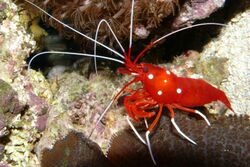Biology:Lysmata debelius
| Lysmata debelius | |
|---|---|

| |
| Scientific classification | |
| Domain: | Eukaryota |
| Kingdom: | Animalia |
| Phylum: | Arthropoda |
| Class: | Malacostraca |
| Order: | Decapoda |
| Suborder: | Pleocyemata |
| Infraorder: | Caridea |
| Family: | Lysmatidae |
| Genus: | Lysmata |
| Species: | L. debelius
|
| Binomial name | |
| Lysmata debelius Bruce, 1983
| |
Lysmata debelius is a species of cleaner shrimp indigenous to the Indo-Pacific. It is popular in the aquarium trade, where it is known as the fire shrimp, blood shrimp or scarlet cleaner shrimp.
Taxonomy
Lysmata debelius was first described by A. J. Bruce in 1983, based on type material from Polillo Island in the Philippines .[1] The specific epithet commemorates Helmut Debelius,[1] who had collected the specimens and sent them to a zoologist for identification.[2] A divergent population from Ari Atoll in the Maldives was later described as a separate species, L. splendida, by Rudolf Burukovsky.[3][4]
Description
Lysmata debelius grows up to 3 centimetres (1.2 in) long, with males and functional hermaphrodites appearing similar.[2] It has a red body, with conspicuous white antennae and white tips to the third to fifth pereiopods.[3] There are white dots on the cephalothorax and legs; white dots on the abdomen distinguish L. splendida from L. debelius.[3]
Ecology
Lysmata debelius is one of a group of species in the genus Lysmata that has the role of a cleaner shrimp in reef ecosystems, alongside L. amboinensis, L. grabhami and L. splendida.[5] It is a popular aquarium pet.[2]
Lysmata debelius is a hermaphrodite and therefore any two individuals may mate. The hatching of eggs, moulting, and copulation cycle is identical to that of L. wurdemanni, yielding weekly batches of zoeae from each pair.[6]
References
- ↑ 1.0 1.1 A. J. Bruce (1983). "Lysmata debelius, new species, a new hippolytid shrimp from the Philippines" (PDF). Revue Française d'Aquariologie 4: 115–120. http://www.aquaportail.com/uploads/pdf/lysmata-debelius.pdf.
- ↑ 2.0 2.1 2.2 Helmut Debelius (1994). "Natantia". Marine Atlas: the Joint Aquarium Care of Invertebrates and Tropical Marine Fishes. Steven Simpson Books. pp. 468–561. ISBN 978-3-88244-051-5. https://books.google.com/books?id=EOY28s5U9ukC&pg=PA474.
- ↑ 3.0 3.1 3.2 Ricardo Calado (2008). "Collected and traded species". Marine Ornamental Shrimp: Biology, Aquaculture and Conservation. John Wiley and Sons. pp. 9–22. ISBN 978-1-4051-7086-4. https://books.google.com/books?id=vkjt5gS82MUC&pg=PA18.
- ↑ Rudolf N. Burukovsky (2000). "Lysmata splendida sp. nov., a new species of shrimp from the Maldives (Crustacea: Decapoda: Hippolytidae)". Marine Biodiversity 30 (3–6): 223–227. doi:10.1007/BF03042966.
- ↑ Andrew L. Rhyne & Junda Lin (2006). "A Western Atlantic peppermint shrimp complex: redescription of Lysmata wurdemanni, description of four new species, and remarks on Lysmata rathbunae (Crustacea: Decapoda: Hippolytidae)" (PDF). Bulletin of Marine Science 79 (1): 165–204. http://decapoda.nhm.org/pdfs/27306/27306.pdf.
- ↑ Porter Betts (2004). "Captive observations of fire shrimp larvae". Advanced Aquarist's Online Magazine. http://www.advancedaquarist.com/issues/nov2004/breeder.htm.
External links
Wikidata ☰ Q1312920 entry
 |

